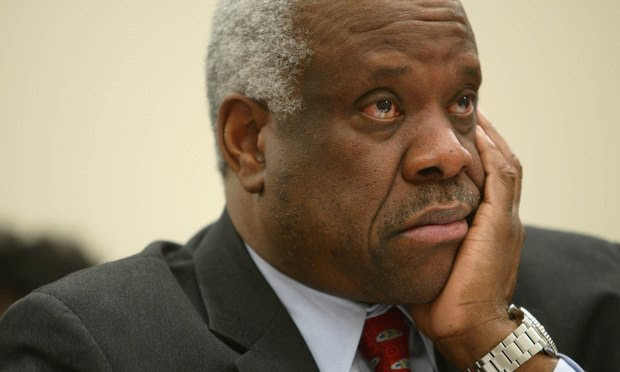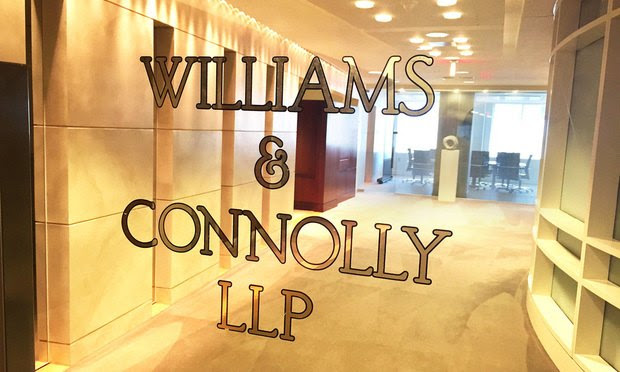More Supreme Court 'Friends' Than Ever | Sessions Lambasts Judges | Thomas Clerk Heads to 4th Circuit Confirmation Hearing
We've got some takeaways on Arnold & Porter's annual Supreme Court amicus curiae docket review, and US Attorney General Jeff Sessions thinks judges aren't showing enough respect to Trump. Plus: Williams & Connolly partner Allison Rushing, a former Thomas clerk, heads to Senate Judiciary today for her 4th Circuit confirmation hearing.
October 17, 2018 at 07:00 AM
6 minute read
We're in the midst of a quieter week at the Supreme Court, which won't return to the bench until October 29. We've got a few takeaways from Arnold & Porter's annual review of amicus curiae practice at the Supreme Court. And more on Attorney General Jeff Sessions' remarks about an issue that Justice Clarence Thomas has featured and will probably get to the court sooner than later: nationwide injunctions issued by federal district court judges. Thanks for reading, and feedback is welcomed at [email protected] and [email protected]

Every Supreme Court Case Has a Friend
Last term was a big one—very big—for Supreme Court amicus practice. That's the main takeaway from Arnold & Porter's annual review of the high court's amicus traffic, which the firm has shared with us for the last seven years.
This year's full report is here—thanks to counsel Anthony Franze and partner R. Reeves Anderson—at Supreme Court Brief. What follows are a few highlights:
➤➤ For the first time since the tally began, at least one amicus brief was filed in every argued Supreme Court case last term. And overall, there were many more amicus briefs than in past years, thanks to cases like Masterpiece Cakeshop (95 amicus briefs) and Trump v. Hawaii (73). “The 2017-18 term saw a resurgence of marquee cases and a corresponding uptick in amicus submissions. Amici filed 890 briefs in 63 argued cases, averaging just over 14 briefs per case, a new record.”
➤➤ Justices mentioned the numbers of amicus briefs to prove a point. Justice Sonia Sotomayor highlighted the “scores of amici who have filed briefs” showing the “deleterious effects” of the travel ban. And in the Janus case, Justice Samuel Alito Jr. said “neither respondents nor any of the 39 amicus briefs supporting them” provided an answer to an issue related to mandatory collection of public-employee union fees.
➤➤ In a couple of oral arguments, justices discussed certain briefs by name—a rare prize. In the travel ban argument in April, Justice Stephen Breyer referenced the “families in the Lisa Blatt brief,” and in Hughes v. United States, justices mentioned UCLA Law School prof Richard Re and his amicus brief ten times. “Professor Re wrote an interesting amicus brief in this case,” Alito said.
Summing up: “Amicus practice at the Supreme Court continues its breakneck pace to file more briefs in more cases. And it appears that the justices continue to find amicus participation a benefit to the process, not a burden (though maybe their law clerks disagree). The current 2018–19 term—with a new justice and blockbuster cases in store—seems poised for another banner year for friends of the court,” Franze and Anderson write.

Sessions Touts Thomas on National Injunctions
During remarks at the conservative Heritage Foundation on Monday, U.S. Attorney General Jeff Sessions unloaded a litany of complaints about federal judges who, he thinks, should show more respect to executive agencies and their policies. Sessions rebuked the courts that have set in place the would-be deposition of Commerce Secretary Wilbur Ross—we're all waiting to hear how the justices resolve the government's challenge—and he returned to knock nationwide injunctions.
The Supreme Court, last term in Trump v. Hawaii, had a chance to tamp down the power of trial judges to issue nationwide injunctions. The court rejected the Justice Department's invitation. Writing alone, Justice Clarence Thomas declared these injunctions “historically dubious” and said they are “inconsistent with longstanding limits on equitable relief and the power of Article III courts.”
Sessions, in his remarks, threw some support to Thomas. “As Justice Thomas wrote in his concurrence in the Supreme Court's decision reversing lower courts and upholding the President's travel order, nationwide injunctions 'take a toll on the federal court system—preventing legal questions from percolating through the federal courts, encouraging forum shopping, and making every case a national emergency for the courts and for the executive branch.'”
Since President Donald Trump took office less than two years ago, Sessions said, 27 district courts have issued nationwide injunctions.
Not everyone believes those injunctions should be barred in all cases. During testimony before the House Judiciary Committee last November, Amanda Frost of American University Washington College of Law said that in some cases they are “essential to provide complete relief to plaintiffs and to ensure uniformity in the interpretation and application of federal law.”
Last month, the House Judiciary Committee approved the Authority Clarification Act of 2018, which would limit federal courts' injunctive power to the parties before them. (Republican committee members also relied on Thomas's concurrence as support for their bill.)
The justices are likely to face the issue sooner than later as a number of cases in the pipeline are coming courtesy of nationwide injunctions.

In Case You Missed It: Williams & Connolly Partner Up for 4th Circuit Hearing
>> Williams & Connolly appellate partner Allison Rushing, a former clerk to Justice Clarence Thomas, heads to Senate Judiciary on Wednesday for her confirmation hearing for the Fourth Circuit. Rushing also clerked for Neil Gorsuch back in his days on the Tenth Circuit. Our colleague Ellis Kim has a peek at Rushing's financial disclosure.
>> The American Bar Association dropped its review of Brett Kavanaugh's “well qualified” rating, CNN reports. That designation was under further review—based on Kavanaugh's angry testimony Sept. 27. The rating process ends after a nominee is confirmed.
>> Term limits, 11 justices, court balancing and more—reshaping SCOTUS is in vogue.
>> “It was a very tough decision to decide to do it myself,” Theodore Frank tells the New York Times, spotlighting his case—Frank v. Gaos—at the Supreme Court. From the NYT report: “He will join a small group of lawyers who have handled the Supreme Court arguments in their own cases. On the whole, they have done rather well.”
>> The justices on Monday denied review in a closely watched pair of cases brought by major corporations challenging liability under California nuisance law for their long-ago promotion of lead pigments in house paints.
>> Georgetown Law's Paul Butler looks at the clerk-hiring practices of Justice Ruth Bader Ginsburg and Justice Brett Kavanaugh. We've got a lot more reporting here, here and here.
NOT FOR REPRINT
© 2025 ALM Global, LLC, All Rights Reserved. Request academic re-use from www.copyright.com. All other uses, submit a request to [email protected]. For more information visit Asset & Logo Licensing.
You Might Like
View All
Court Overturns $185M Fee Award for Quinn Emanuel in ACA Litigation

The Supreme Court Leaker That Never Was | This Term's 1st Opinion | Attorney-Client Privilege
9 minute read
Who's Arguing at the Lectern | Union-Busted Cement Trucks | Emergency Application Catch Up
9 minute read
Is It Legal Advice or Business Advice? | What Chief Justice John Roberts Didn't Say
Trending Stories
- 1We the People?
- 2New York-Based Skadden Team Joins White & Case Group in Mexico City for Citigroup Demerger
- 3No Two Wildfires Alike: Lawyers Take Different Legal Strategies in California
- 4Poop-Themed Dog Toy OK as Parody, but Still Tarnished Jack Daniel’s Brand, Court Says
- 5Meet the New President of NY's Association of Trial Court Jurists
Who Got The Work
J. Brugh Lower of Gibbons has entered an appearance for industrial equipment supplier Devco Corporation in a pending trademark infringement lawsuit. The suit, accusing the defendant of selling knock-off Graco products, was filed Dec. 18 in New Jersey District Court by Rivkin Radler on behalf of Graco Inc. and Graco Minnesota. The case, assigned to U.S. District Judge Zahid N. Quraishi, is 3:24-cv-11294, Graco Inc. et al v. Devco Corporation.
Who Got The Work
Rebecca Maller-Stein and Kent A. Yalowitz of Arnold & Porter Kaye Scholer have entered their appearances for Hanaco Venture Capital and its executives, Lior Prosor and David Frankel, in a pending securities lawsuit. The action, filed on Dec. 24 in New York Southern District Court by Zell, Aron & Co. on behalf of Goldeneye Advisors, accuses the defendants of negligently and fraudulently managing the plaintiff's $1 million investment. The case, assigned to U.S. District Judge Vernon S. Broderick, is 1:24-cv-09918, Goldeneye Advisors, LLC v. Hanaco Venture Capital, Ltd. et al.
Who Got The Work
Attorneys from A&O Shearman has stepped in as defense counsel for Toronto-Dominion Bank and other defendants in a pending securities class action. The suit, filed Dec. 11 in New York Southern District Court by Bleichmar Fonti & Auld, accuses the defendants of concealing the bank's 'pervasive' deficiencies in regards to its compliance with the Bank Secrecy Act and the quality of its anti-money laundering controls. The case, assigned to U.S. District Judge Arun Subramanian, is 1:24-cv-09445, Gonzalez v. The Toronto-Dominion Bank et al.
Who Got The Work
Crown Castle International, a Pennsylvania company providing shared communications infrastructure, has turned to Luke D. Wolf of Gordon Rees Scully Mansukhani to fend off a pending breach-of-contract lawsuit. The court action, filed Nov. 25 in Michigan Eastern District Court by Hooper Hathaway PC on behalf of The Town Residences LLC, accuses Crown Castle of failing to transfer approximately $30,000 in utility payments from T-Mobile in breach of a roof-top lease and assignment agreement. The case, assigned to U.S. District Judge Susan K. Declercq, is 2:24-cv-13131, The Town Residences LLC v. T-Mobile US, Inc. et al.
Who Got The Work
Wilfred P. Coronato and Daniel M. Schwartz of McCarter & English have stepped in as defense counsel to Electrolux Home Products Inc. in a pending product liability lawsuit. The court action, filed Nov. 26 in New York Eastern District Court by Poulos Lopiccolo PC and Nagel Rice LLP on behalf of David Stern, alleges that the defendant's refrigerators’ drawers and shelving repeatedly break and fall apart within months after purchase. The case, assigned to U.S. District Judge Joan M. Azrack, is 2:24-cv-08204, Stern v. Electrolux Home Products, Inc.






